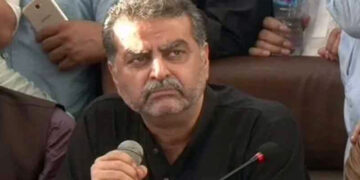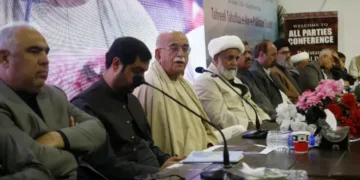
KARACHI: A book titled ‘What’s wrong with Pakistan?’ written by eminent journalist Babar Ayaz was launched at a hotel on Friday.
The main feature of the event was an interesting discussion on the contents and genesis of the book with the writer anchored by journalists Asif Noorani and Amir Zia. Mr Ayaz was first requested to read out a couple of passages from What’s wrong with Pakistan?
The author obliged and mentioned that at the beginning of every journalist’s career he’s asked to learn about the five Ws (what, where, when, who and why). Citing examples of the likes of political economist Adam Smith and economist and revolutionary socialist Karl Marx, he pointed out they studied why society behaved in a particular way.
He said he had read many books on the topic he chose to write on but had found out that those books shied away from calling a spade a spade. His was an attempt to call a spade a spade. He then read out passages from the preface to the book in which he touched upon issues such as distrust between institutions and provinces, military operations, war on terror and the notion of a failing state espoused by certain writers. He said there was a need to have an unbiased and dispassionate diagnosis. He argued Pakistan was born with a genetic defect.
After the reading was over, Mr Noorani asked the writer about why he penned a book at such a later stage in his life. The author replied that when he was a young student in Sukkur, he was required to read Shakespeare. It made him think to himself that Shakespeare would not have even imagined that one day his work would be read in a place called Sukkur. This meant writing helped you live on. Mr Ayaz said he was not in favour of compiling his newspaper columns into a book. The fact that Syed Sibte Hasan began writing after he turned 60 proved an encouraging factor as well.
Mr Zia’s first question was about challenging the popular narrative, that is, the Two-Nation Theory, in the book, which he termed was not for the faint-hearted. The writer said the chapter the host was referring to was thought of in 1997 when he (Mr Ayaz) met a BBC journalist who was doing a story on the 50 years of Pakistan’s independence.
Answering a question of the foreign journalist, he mentioned that we (Muslims) had ruled India for eight centuries but when the question of democracy was raised, suddenly we realised we were a separate nation. He said the demand for a separate land primarily had to do with Indian Muslims’ economic and political rights.
Even in the famous ‘14 points’ there was only one point on religion and the emphasis was not on Islam but on Muslims’ rights. To get the support of the masses, the ruling classes of Punjab and Sindh exploited religion. In 1937, the Muslim League had lost the elections so they used religion as a means to an end. They didn’t realise that the means started dictating another end. So the mullahs took over. The space that terrorists today got had the same narrative, he said.Mr Zia countered the argument by saying it was the Congress that started communal politics in India, to which Mr Ayaz responded that though he agreed with his point, he tried to find out in his book what went wrong with us.
He said he had also criticised the likes of Nehru and Gandhi, however, what Gandhi was talking about was a secular set-up. Mr Zia weighed in suggesting there was no final interpretation in history, to which Mr Ayaz agreed and added the Congress was supported by Hindu businessmen and big businesses always looked for centralised power. On the issue of religious factions role (Barelvi, Deobandi, etc), the writer said that to have the support of the masses, in Punjab for example, they used pirs and maulvis to go with the narrative.
He said no state was made in the name of Islam, because Islam had a concept of the Ummah.Mr Noorani was of the opinion that the writer was soft on feudal lords in his book to which he remarked he wasn’t and argued that things had changed and now the business class was in power. Noorani then asked him about the harm that General Ziaul Haq had done to culture. The writer replied Gen Zia had caused far more serious damage, such as introducing the controversial Islamic laws. He gave a few stats one of which was that these days there were 250,000 mosques in the country, which meant there was one mosque for every 240 odd people.
When the writer was questioned about what needed to be done, he commented a sequencing of issues was required. Religiosity and extremism had to be dealt with first, not just through military power but through media. Terrorists had captive audiences in mosques whereas we had failed to work on that front. And “you have to be a secular country,” a country that should not meddle in Afghanistan and Kashmir, he added.
After the panel discussion, the audience was allowed to ask questions. Answering a query, Mr Ayaz said Jinnah was not a political scientist but a lawyer that was why he could not fathom the issues pertaining to multi-ethnicity. As for why he chose to publish the book abroad, he said he wanted an international publisher. – Dawn











